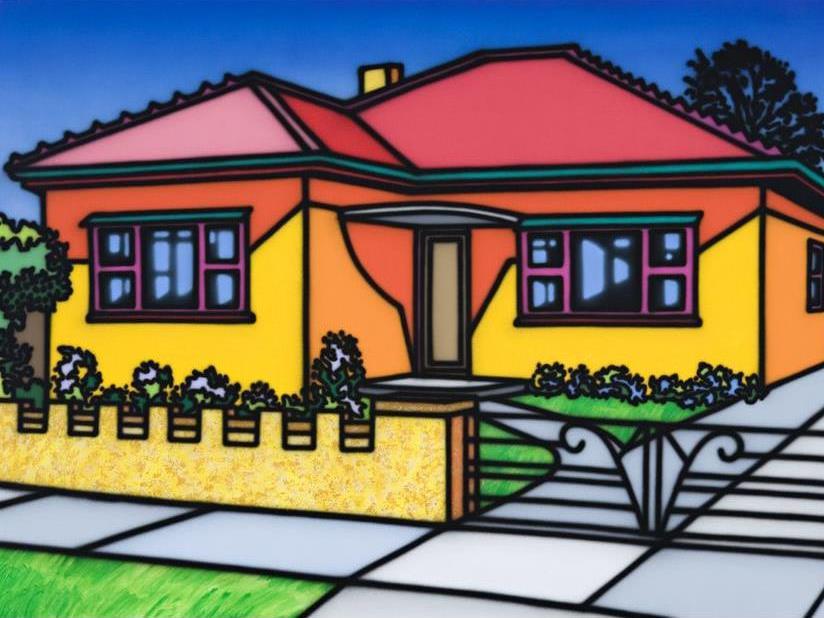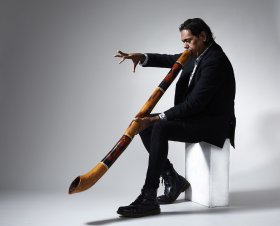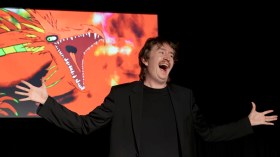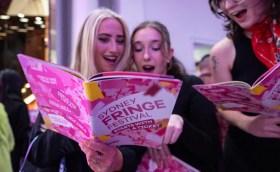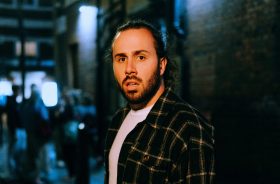Howard Arkley, A Splendid Superior Home, 1989, synthetic polymer paint on canvas, 174.5 x 254.
Writer and editor Jessica Alice grew up in Werribee, about forty minutes southwest of Melbourne CBD. She describes high school as one of those places that wasn’t quite ‘art-literate’ and where careers in the arts where never clearly understood by students.
‘In high school it was pretty much me and my best friend Jake and we were the weird art kids. We just did our own thing….and even though we had solidarity with each other, it wasn’t apparent to either of us that these creative pathways were there,’ said Alice.
‘Jake is now a really incredible curator and photographer, but at the time he thought he had to be a photo-journalist because it just seemed like the art bit wasn’t apparent and I didn’t even realise that you could study poetry.’
Eventually they both found those avenues, but it took some time, explained Alice. ‘I think if I had lived closer to the city maybe it wouldn’t have taken that long, maybe it would have been apparent the kinds of things available.’
There is definitely a disconnect between the experience of growing up in the suburbs and growing up within spitting distance of the CBD or in the inner city. It can feel like a fortunate “accident” when you end up in a creative career and come from the burbs.
‘A lot of the people who play this sort of music that I’ve been trained to play are crazy rich by necessity.Music composer and researcher Dan Thorpe describes a similar experience of growing up in Elizabeth, a small suburb about forty-five minutes from the Adelaide CBD.
‘I had no idea that art could be a career. I actually studied law at first because that’s what you do if you get good marks, you went and studied law.
‘It was weird I didn’t even know the Conservatorium existed until my piano teacher said, “You know, you should really audition.” And I was like, there’s a school? That’s a thing you can do at uni? Really?’
Although always driven to pursue a career in writing, poet Omar Sakr, who grew up in Western Sydney, also stumbled across his future choice of university course in writing by chance.
‘How I found out about writing was just by mistake, as far as it being a pathway. I went to an open university day at Macquarie Uni when I was in Year 12 and I was flicking through a book and saw writing was a thing and I was like, “Holy shit, you can study storytelling.” That’s all I wanted to do, all I wanted to do was read,’ said Sakr.
Each of these talented artists describe their early relationship with the arts and the artistic careers they are now pursuing as one of coincidence, unplanned and almost accidental, although the passion was always there.
But all are aware that had they grown up in a suburb or school blessed with a performing arts program or studio the path could have been much easier.

For the 2013 Sydney Festival the Rubber Duck made its way down Parramatta River.
‘I think there is definitely a lack of literary presence or creative presence in the suburbs at that local level,’ said Sakr.
‘A few months ago I went to the West Writers forum in Footscray, which was directed by the amazing Alia Gabres, it was incredible that virtually everyone there was young and diverse in multiple ways. The minority was the majority, both in the audience and on the stage. I remember thinking to myself, imagine if this had been a thing in Liverpool. Imagine if I had access to this as a kid. I would have been able to articulate things that I didn’t have language for at the time but was still there. It was an incredible, formative experience that needs to happen more in suburbs everywhere.’
There are some organisations located in the suburbs who are doing great work, like the Campbelltown Arts Centre in Western Sydney, or the Burrinja Cultural Centre in Upwey on the outskirts of Melbourne, to name only two. Plus good news for suburban Sydney, the NSW Government recently committed an additional $7.5 million over the next four years to grow the artistic excellence of the region and invest in local Western Sydney talent and jobs.
There is clearly a need for more access to the arts in suburban Australia. But at the same time, we need to consider affordability and relevance for these audiences.
For Thorpe, affordability is a big issue for his sector in particular and creates issues around access for diverse audiences. ‘The biggest access challenge in my art form is that no one can fucking afford an $80 ticket. No one can do that,’ said Thorpe.
‘It is so deeply strange to me that people especially in orchestra and operatic contexts, say that they are trying to adapt to the community, but then charge through the nose for something that has no relevance to their life in 2016. What are we doing as a practice if we are not making something that tells someone something about being alive in 2016? And look, Beethoven has a shitload to say about that, Mozart has a shitload to say about that, but it is simply not good enough to present these things as museum pieces for $80 a pop and then be like, “Well, I simply don’t know where everyone is.”’
‘The reality is that if we want to encourage diversity we need to work with people who aren’t from our incredibly white, not even middle class, like upper class field. Do you know how much a contrabassoon costs? Well over $100,000. It’s crazy but the reality is a lot of the people who play this sort of music that I’ve been trained to play are crazy rich by necessity.’
Affordability is not just an issue for classical music and composition, but also for the literary arts. When compounded with a discussion of the suburbs, affordability relates to other consideration about race and class, as well as gender and sexuality.
As Sakr said, ‘I think class and writing has to be brought up and I think this is a really big disadvantage for people of colour and Indigenous writers as well. How do we get into this [career] when every writer will tell you that what they need is time, and time is money. So how do you get it without having access to someone else’s money or a loan? You are either staying at home for a very very long time, which not all of us can do if we are queer and from a very homophobic family, or whatever it may be. So there are definite blocks to pathways for a lot of communities and that’s something that needs to be addressed, although how I don’t know.’
As Alice also said, it can be a struggle to work in the arts sector when you begin to recognise the kind of privilege that comes with it.
‘I find it really difficult to exist in arts culture. As I get older the working class chip on my shoulder seems to get bigger and I often struggle with the privilege that I see around me because a lot of my peers were raised in really artistic environments, or maybe not even artistic, but quite cultured and knowing how to exist in the spaces that you have to exist in if you want to do something like art.’
‘It is a conversation that we don’t have very often. Things like ‘pay for writers’ is such a hot topic, we always talk about how we need to pay writers, but we never really talk about how people afford to write in the first place. We know that unpaid internships are unsustainable, but the people who do them are the people who can afford to do them.’
Growing up in the suburbs isn’t only a negative. In terms of access there are clear barriers that organisations like Footscray Community Arts Centre are addressing, but the new perspectives that come from the suburbs are also important for the arts.
As Thorpe said, there are things that the suburbs teach us, or rather things it fails to teach us that can become a strength in creative practice later on.
‘I don’t know the rules of classical music at all. And I think that has been the biggest strength of my career and programming more generally, is that I don’t have any idea what I am meant to program, so I just program what my total sense of ethics says I am meant to program. And it’s weird because people get scandalised, really scandalised when there’s no Beethoven. But I don’t care, he’s dead!’
This article is based on a panel for the Digital Writers’ Festival titled Art and the Suburbs.

